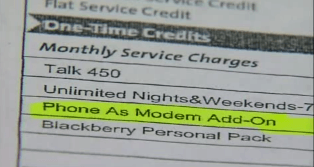
Meet Daniel and Kate Methot, proud owners of $5000+ in Bell data charges the company cannot explain.
A couple from Merritt, B.C. has received bills from Bell for more than $5,000 in data usage, even after the skyrocketing bills made the family so frightened of their phone, they turned it off.
This is the story of Daniel and Kate Methot, who purchased a smartphone from Bell in October of last year. When the first bill arrived, it contained more than $1,000 in data charges.
“My wife looked at me and I thought ‘Oh boy, what did I do that I didn’t know that I had done? I am in trouble’,” Daniel told CBC News.
When Internet Overcharging of this magnitude occurs, most people first blame themselves, assuming they did something wrong. The Methot family figured they downloaded a malfunctioning or data hungry app or left something running on the phone.
“We never thought we would be billed for something we weren’t using. That was sort of a new concept for us,” Daniel said, but the family still sought guidance from Bell on how the charges could get that high.
“They really couldn’t give us an answer,” Kate said.
The family deleted everything they could find on their new Samsung Galaxy phone in hopes of stopping the surprise charges.
 But when the December bill arrived, the couple was horrified to discover their new bill was more than $3,500 — almost entirely for data usage that literally cost Bell pennies to provide. In fact, the phone company managed to bill the couple for 30 hours of usage during one 24-hour day, a clear warning sign there was a severe billing problem at work here.
But when the December bill arrived, the couple was horrified to discover their new bill was more than $3,500 — almost entirely for data usage that literally cost Bell pennies to provide. In fact, the phone company managed to bill the couple for 30 hours of usage during one 24-hour day, a clear warning sign there was a severe billing problem at work here.
But when it comes to protesting charges with Bell, the Methots discovered customers are guilty until proved innocent.
“I felt like I was being treated like a criminal — like we were trying to essentially steal from them,” Daniel said. “When you call in to argue a bill, that’s what they do. They tell you to pay — and don’t ask questions.”
Kate got a stern lecture from Bell telling her to quit watching videos on her phone all day long.
Of course, the couple denied doing any such thing. In fact, by the time January arrived, both Daniel and Kate became afraid of even going near their phone, much less using it. The couple routinely shuts the phone off when they are not actually using it for calls, but still the data charges kept coming — more than $5,200 to date.
CBC News asked Bell several times for a response to the Methot’s complaint. While refusing an in-depth interview on the topic, Bell told CBC News it cannot yet explain what is happening with the account.
That hardly inspires confidence for the Methot family. Despite Bell being unable to explain the charges, they continue to insist on being paid for at least some of them.
The couple even hired a lawyer for $400 to send a letter to Bell demanding better answers or the couple would not continue to pay the unexplained charges.
In that case, Bell would simply turn their account over to collections, and potentially ruin their credit rating.
 Bell’s theories about the stratospheric bills include:
Bell’s theories about the stratospheric bills include:
- They are running up the bill themselves and now trying to run away from the charges they incurred;
- They are using the phone’s Wi-Fi hotspot feature, inadvertently allowing the entire neighborhood to share their connection;
- They are watching Netflix all day and into the night;
- They ran across the border into the United States and are incurring roaming charges;
- They are tethering their computer to the phone and that consumes massive amounts of data.
The one explanation Bell hasn’t imagined is that their billing system is completely fouled up and their usage meter cannot be trusted. One might imagine Bell could actually determine where the phone is being used, to dismiss the roaming theory. Plus Daniel reports he is incurring data charges even when the phone is completely powered off.
Finally, Bell admitted they were responsible, credited the account for more than $3,000 of the charges, and the Methot family thought their long nightmare was over.
Only it isn’t.
Days later, though, they received a bill with $1,204 in new charges.
“It was just a temporary relief and then the stress is back again,” Kate said.
“At that point I wasn’t interested in being a Bell customer anymore,” Daniel added.
On top of that, Bell has reneged on their apology, now claiming they were not responsible for the faulty charges after all. The Methot family can pay their $1,200 phone bill with cash, check, money order or credit card. And if they plan to leave, they better be ready to cough up the early termination fee as well — another several hundred dollars.
Isolated incident? Don’t bet on it.
“These customers are not alone,” Howard Maker, the head of the federal Commissioner for Complaints for Telecommunications Services told CBC News. “Unfortunately, Canadian telecom consumers do suffer from many billing errors from their providers.”
Maker said his office received more than 1,900 complaints about wireless providers last year, and 40 per cent of them were about overcharging.
With Bell insisting customers can trust their usage meter — the one that generates $5,000 in data charges for one family alone — Canadians should prepare themselves for the bills that will follow. With no oversight agency able to monitor the accuracy of the meter, Bell customers will just have to take their word for it.
[flv width=”640″ height=”388″]http://www.phillipdampier.com/video/CBC News Couple’s huge bills unexplained by Bell 3-1-11.flv[/flv]
CBC News talks with the Methot family about their Internet Overcharging experience. (5 minutes)


 Subscribe
Subscribe







